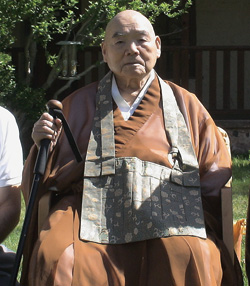
The songwriter Leonard Cohen recently said of his teacher, Joshu Sasaki Roshi, “He became someone who really cared about—or deeply didn’t care about who I was. Therefore, who I was began to wither. And the less I was of who I was, the better I felt.”
A “master’s master” or “teacher’s teacher” are common phrases I heard in speaking to people about Joshu Sasaki Roshi, who celebrated his one hundredth birthday on April first.
A Rinzai monk since the age of fourteen, Sasaki Roshi came to Los Angeles from Japan in 1962 and founded an American lineage known for vigorous, uncompromising practice. Beginning with a neighborhood center in Gardena, California, he later established Cimarron Zen Center in Los Angeles in 1966, Mount Baldy Zen Center in 1971, and over thirty other centers since then. He still leads twenty to thirty weeklong retreats a year.
“He’s a throwback to an earlier kind of teacher,” says Seiju Bob Mammoser, senior monk at the Albuquerque Zen Center. “He teaches students to look through fresh eyes at their own experience.” When I discover Roshi is lecturing at his Bodhi Manda Center in Jemez Springs, New Mexico, I can’t resist driving the two hours from Taos to listen. Despite his being “a little wobbly,” as Roshi puts it, there’s hardly any sign of this once he takes his seat before the group. He could easily be a man in his sixties; some of the college students present don’t look half so alive.
Sasaki Roshi has been quoted as saying, “If you want to explain enlightenment, you have to make up a new language.” This morning he pokes gentle fun at scholars and philosophers, while delivering his own startlingly fresh presentation of Zen, a notoriously difficult one to summarize. (His long-time translator Shinzen Young quips, “Is there a succinct way to express Einstein?”) Fond of mathematical formulations, Roshi famously renders emptiness as “zero.” Ego he calls the “I am” self. The dualistic realms of “plus” and “minus” continuously merge into and reemerge from unity, expressed as “God,” “perfect time,” or even “true love.” All is constantly changing; nothing, as Roshi likes to put it, is “fixated”—even ultimate reality.
Later I’m talking with Giko Rubin, Roshi’s current translator, when Seiju appears with a surprise invitation: “Roshi wants to see you both. Now.”
Sasaki Roshi awaits, seated in an armchair; several senior monks join us. As expected, my introduction provokes some traditional Zen jousting. “Buddhist magazine?” Roshi says. “Hmm. Maybe not so good.” Laughter. Someone brings a copy of Tricycle, which he flips through, examining each page. “Still, you make money with Buddhist magazine, maybe good.” More laughter.
There’s nothing for me to do but dive in. “Roshi, you’ve said you wouldn’t die until Zen was born in America. Has that happened?” “I’m a hundred years old. My ears can no longer hear stupid questions.”
This is par for the Zen course. Roshi knows I practice; he’s telling me to get real. “Roshi, what did you mean by perfect time?” “Not subject, not object. Not to be taken lightly. I would like you to awaken to that state, please.”
At this someone corrects Giko’s translation. “I don’t think he said ‘please.’” Laughter. It’s kind laughter, though. They’ve been through this themselves.
“Roshi, what did you mean by true love?”
“If you want to understand true love, you must be true love. If there is not true love in relationship, the result is trouble.”
He looks straight at me and I suddenly intuit his meaning. In Zen what you put out is what you get back. I lean forward; although his eyes seem bottomless, they are not difficult to look into. “I’d like to understand true love, Roshi.”
“Ah, true love.” Roshi nods, smiles, and extends his hand. Deeply moved, I take it in mine. He laughs softly. “The result of everything is true love.”
What more is there to say? He hands the copy of Tricycle back. “Good magazine,” he says, though I’m not sure how he came to this conclusion.
The question with Sasaki Roshi always remains: will he name a successor? He has some twenty-five senior monks—“oshos”—many of whom have been with him for decades, now teaching at affiliated centers. Yet none has received inka, his complete seal of approval. Alone among the original teachers who brought Zen to America, Sasaki Roshi has held out in naming anyone to lead his lineage after he has gone. Is it because no one meets his standards, or because, to use Seiju’s words, he doesn’t want to lose the chance to “relentlessly push” his primary disciples “to deeper and deeper insight”?
When I ask Koyo Engennach, leader of the University Zen Center in Boulder, Colorado, and Sasaki Roshi’s student since 1973, whether any American has completely grasped Sasaki Roshi’s dharma, he tells me, “It remains to be seen.”
Why, I ask Koyo, have so many senior monks stayed with Sasaki Roshi for so long, through such a difficult practice? “Because he has such a deep reach into the human condition. He’s always offering a little bit more—always drawing up a deeper and broader understanding. It doesn’t grow old.”
How long will he go on? Joshu Sasaki Roshi shows no signs of stopping. But then Master Joshu, his namesake, is said to have lived to be one hundred and twenty.
Thank you for subscribing to Tricycle! As a nonprofit, we depend on readers like you to keep Buddhist teachings and practices widely available.